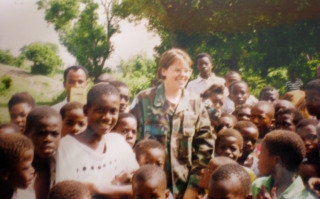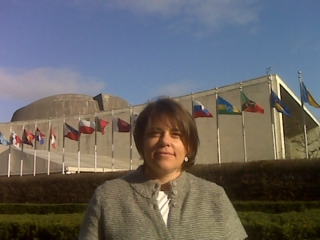This is the fourth installment in the weekly Honored Role Series.
“It is amazing how more alike we are than we are different,” said Jen Boggs, Coordination Officer in the Office of the Under-Secretary-General for Peacekeeping at the United Nations. “The vast majority of people from all backgrounds want the same things: to live in a safe society that provides a system of justice, to know that their children will have a better left than they did, and to have a voice in the world.” Jen should know. She has worked extensively in places such as Korea, Bosnia, Hungary, Italy, Sudan, Iraq, Haiti, Cote d ‘Ivoire, and Liberia as a military officer and as a UN peacekeeper.
Not having the money to pay for college, Jen followed her older sister to West Point. She liked the idea of a first rate education paid for by the US government, three hot meals a day, uniforms for every occasion, a dorm and a job upon graduation. “Although I applied to West Point out of practicality, I quickly became committed to becoming an Army officer and a member of the Long Gray Line.”
Jen graduated West Point in 1992, a year after her sister. Commissioned as a transportation and logistics officer, Jen’s initial assignment to Korea developed her love of working with and learning from people of other cultures. As a lieutenant, Jen ran a vehicle maintenance facility where she led 5 US soldiers and 56 Korean drivers and mechanics. She and her senior non-commissioned officer became the first Americans, in 30 years, to earn an award from the Korean Service Corps Union for improved work conditions and labor relationships at Fort Casey, South Korea.
Catching the “Bug”
After a year in Korea, the Army assigned Jen to Ft. Bragg, North Carolina, Selected to join a Special Forces unit as part of the United Nations Mission in Haiti (UNMIH), she deployed to the island nation shortly after arriving at Ft. Bragg.
This mission provided Jen’s first experience working in a multi-national organization; 24 countries contributed military personnel and 19 contributed civilian police forces. The soldiers traded their camouflage Kevlar helmets for the blue helmets synonymous with UN peacekeeping. Jen said, “It is very rare for the US troops to fall under UN authority. It was an exceptional opportunity and the multi-cultural interaction was incredibly rewarding”
At its peak in June 1995, UNMIH deployed more than 6,000 military personnel and some 850 police to Haiti. The UN had a four-fold mission: help maintain security and stability, aid in the return of constitutional rule, assist in the training of a new national police force and the holding of an election. Additionally, UNMIH contributed to the restoration of basic life services and infrastructure that had suffered from years of dictatorial neglect and international economic sanctions.
Jen’s next posting took her to Europe. Based in Germany, she deployed to both Bosnia and Hungary. In Hungary, her team was responsible for deploying soldiers and equipment for the NATO mission in Bosnia. Here she learned some lasting leadership lessons: delegation and trust. Upon completion of the mission, one of Jen’s departing soldiers thanked her for trusting in his ability and delegating the actual implementation of the work to him. He told her and others how Cpt. Boggs’ belief in his skill to do the job changed his perspective and instilled confidence. “It’s amazing what people can accomplish with training, trust and freedom to do their job,” Boggs said.
About this time, Jen became interested in pursuing new experiences. Reflecting back on her peacekeeping experience in Haiti, Jen said, “I caught the UN bug. It was simultaneously fascinating and challenging to work with such a diverse group of people. Each meeting and activity was an international event.”
According to its own website, “United Nations peacekeeping is a unique and dynamic instrument developed by the Organization as a way to help countries torn by conflict create the conditions for lasting peace.”
Transitioning to Peacekeeper
Following 8 years of active duty service, Jen applied for various jobs with the United Nations. Two years after applying, the UN contacted her for an interview. Four weeks later, Jen arrived at her first duty assignment in Brindisi, Italy at the UN Department of Peacekeeping’s Logistics Base (UNLB) and unbeknownst to her, the first woman Chief Transport Officer in the United Nations.
As Jen had spent the two years in the applications process putting her logistics knowledge to work, the transition from warrior to peacekeeper seemed seamless. She said, “After not hearing anything I gave up and joined Home Depot’s store leadership program. But than the phone call came. And it was life-changing.”
At UNLB, Jen’s responsibilities included devising, implementing and maintaining the peacekeeping missions strategic deployment stocks of more than 1,100-vehicles. Although she loved the southern Italian countryside, Jen was keen to get into the field. That opportunity came in 2005.
The Sudan
Following more than 20 years of a bitter north-south civil war fighting over power, scare resources, religion and self-governance, the Government of Sudan and the Sudan People’s Liberation Army/Movement (SPLA/M), led by Dr. John Garang, signed a Comprehensive Peace Agreement (CPA) on January 9, 2005. By it’s resolution 1590 of March 24, 2005, The Security Council of the United Nations decided to establish the United Nations Mission in the Sudan (UNMIS) to support implementation of the CPA and to perform certain functions relating to humanitarian assistance, and protection and promotion of human rights.
In the two decades of fighting more than 2 million people died, 4 million were displaced and some 600,000 people fled the country becoming refugees.
In this newly shared government, Garang became the first Vice President of Sudan and the President of Southern Sudan. In late July, weeks after assuming the vice presidency, Garang died in a helicopter crash. Along with the great loss to the country was the challenge of how to simultaneously hold a funeral for the leader of the SPLM/A with a state funeral for the vice president of the country.
Jen and the UNMIS logistics team provided support for the funeral. She described:
We handled every aspect of ground and air transportation for every leader coming to Juba to pay their respects to Dr. Garang. Former government leaders, rebel fighters, tribes’ people, civilian supporters and world leaders arrived. The streets were lined with alternating soldiers and rebels, former enemies. There was no fighting. Shortly after the funeral concluded, one of the rebels close to Garang took me aside and shared how important this event was for him, his people and his country. It is indescribable to witness such a profound moment in the history of a nation and to know you played some tiny part.
Jen left Sudan for Iraq. For 18 months as part of the United Nations Mission in Iraq (UNAMI), she led the control and development of mission’s vehicle fleet in Amman, Jordan, Kuwait, Baghdad, Erbil, Basra and Kirkuk. Being among American soldiers in the Green Zone she said felt a little like being home stateside.
In 2007, Jen returned her focus to the Sudan and joined the Darfur Planning Team at UN Headquarters in New York City. She has since traveled several times to Darfur and to Addis Ababa, Ethiopia to work with the African Union and support efforts to develop the mission for Darfur. The United Nations African Union Mission to Darfur (UNAMID) anticipates deploying more than 20,000 international troops and 5,000 civilians to the region.
Seven years after joining the United Nations, Jen still has the UN Bug. She quotes Paul Boateng, the British Ambassador to South Africa, “my goal is to make good progress in a hazardous world.”
If you would like to share your story or that of another veteran women, please contact me. Part 5 of the Honored Role series will feature a retired lieutenant colonel and her transition to the private sector.


Comments are closed.